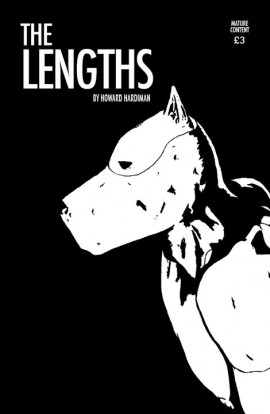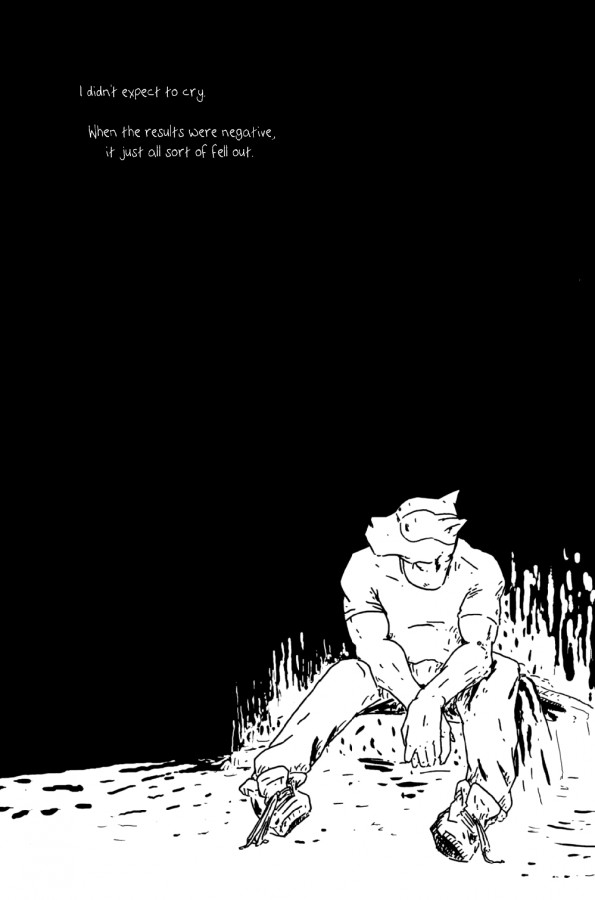
When did I last read a novel about gay male escorts that didn’t make me want to set the world on fire with rage? It was probably Rupert Everett’s Hello, Darling, Are You Working?, one of the sex workers’ rights advocate/actor’s less well-known works. But also I read that book years ago, so long ago in fact that I don’t really even remember too much about it, beyond that it wasn’t completely maddening.
I haven’t done a study or anything, but it seems that rent boys feature in memoirs a lot more than they feature in novels. (The most recent example I know of was self-published by gay porn star Christopher Daniels in November; I haven’t read it.) But even some of the fictional works—Everett’s among them—are at least somewhat autobiographical. Howard Hardiman, author of eight-issue comic The Lengths, fits into that category. In an interview with The New Statesman he says he “did a bit of sex work” with some of his escort friends, and it’s evident that he sympathizes with his characters. The Lengths is fiction, but in addition to (presumably) drawing on his own experiences Hardiman clearly did a lot of research, interviewing London’s male sex workers as he assembled the story of a wayward dog named Eddie.
Yes, Eddie is a dog. I think he’s a bull terrier? I’m not the best at identifying dog breeds. (Which is funny because in addition to being a former escort I’m also a former dogwalker.)
Eddie’s young and athletic and artistic, but he lacks focus, dropping out of school and meandering through London like the twenty-somethings of so very many other works of literature. If he were not an anthropomorphized dog I would probably have a big crush on him, in the way that I have big crushes on most young literary characters with no clear objectives and propensities for terrible decision making.
Eddie turns to escorting, which isn’t in itself presented as a dumb decision. It’s just a way for him to make some extra money. He models for an ex-con who publishes a trendy gay magazine, cleverly called Mincemeat, and adopts the name Ford. (Ford Escort, get it? Why have I never heard this joke before? I’m serious.)
The narrative arc is sad if a little predictable. He falls for a bad-news meathead, starts taking ketamine (England!), and has an existential crisis after finding a copy of Mincemeat in Dan’s apartment. Dan’s the friend that Eddie’s been slowly courting; he’s also my favorite character in the story. Dan’s a graphic designer, a regular guy with a dapper beard and a penchant for elegant outerwear. He might be a Schnauzer? Or some sort of bearded terrier. (Parts of this hit a little close to home. I publish a homoerotic magazine! My boyfriend is a graphic designer with elegant facial hair! I internalized a lot of crap when we started dating and I was still escorting! That part’s no fun, but Hardiman presents it well.)

One of the more intriguing parts of the book is that you don’t really feel bad for Eddie, the escort who makes all the bad decisions, but you do end up feeling bad for many of the characters who aren’t sex workers: Dan especially, and some of the more minor characters like Krys, the financially grounded but emotionally insecure bear. (I mean bear in the gay sense that he’s big and wears sweater vests and gives his friends big hugs in museums. I’m not actually sure what kind of dog he is.) All of the characters are more or less people I know in real life, and for every section of the book about sex work there’s an equally engaging bit about being young and gay and urban and overly educated.
A note about the dogs: they’re actually drawn less as dogs and more as humans with dog heads. There’s very little canine behavior in the story, except in the commonly accepted metaphorical sense that men are kind of dogs; obsessed with humping and kind of dumb and unsanitary but primarily adorable. There might be a more appropriate species to represent men as a whole, but there’s not a more common one and it suits most of these characters. Especially Eddie. But nobody’s eating his own poop or chewing the corners off coffee tables or anything.
At the end of the book I was literally sobbing, which is not what I normally do at the end of books, and clichéd though it is I actually got tear stains on the last page. It’s sad! Although how much of this sadness derived from the book and how much was merely my own irrelevant sorrows I can’t say. (I mentioned it hit a little close to home at times.) My one gripe, and, okay, it’s kind of a major one, is that The Lengths concludes with a two-page interview with an actual London escort. He’s HIV-positive, and he says that his viral load is undetectable and that he doesn’t disclose his status to his clients. Failure to disclose HIV status happens all the time, in cities all over the world, and even casual scans of gay male hookup sites indicate that this phenomenon is not unique in any way to sex workers. I really wish that what is frankly a really touching story didn’t end with such a clunky epilogue, especially since HIV only minimally factors into the plot of The Lengths. It’s like when you’re watching What’s Love Got to Do with It and at the end the real Tina Turner shows up for the last song and you’re like, “Wait, if that’s Tina Turner then who’s this Angela Bassett impostor that I’ve been watching for the last two hours?” (I’m sure that there’s a better example that isn’t from 1993 but for some reason that’s the only one jumping to my head right now.)
The Lengths was recently published in hardcover form by Soaring Penguin, an English graphic novel imprint that I was previously unfamiliar with but whose catalog is totally intriguing. It’s gotten rave reviews, recently receiving an honorable mention in Publisher’s Weekly’s Comics World Critics Poll.
To end on a more positive note, author Howard Hardiman is completely fascinating in every way. His other recent projects include giving the Twin Peaks treatment to a book of poems about Angela Lansbury, and also there’s The Peckham Invalids, a comic about disabled superheroines in Edwardian England. And any author who was described as “suave” by Simply Knitting magazine must be a really special human.
[…] By Matthew Lawrence […]
Solid review. Keep up the good work!
[…] the like. But as graphic novels get more of a foothold in sex work lit with titles like Rent Girl, The Lengths, and Melody: Story of A Nude Dancer, plus popular sex worker comic artists like Jacq The Stripper […]